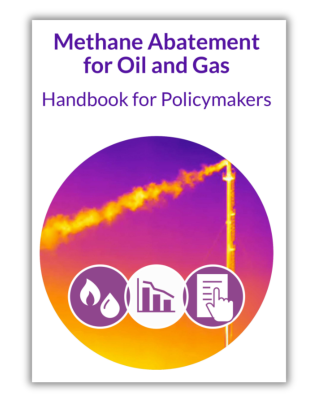Oil & Gas
When methane escapes from oil and gas operations, a valuable product is wasted. Through better monitoring and improved operational standards, governments can help companies reduce their methane emissions, often at a profit.
See below for key oil and gas resources.
-

Methane Abatement Costs in the Oil And Gas Industry
In this discussion paper, Joseph Aldy, Forest Reinhardt, and Robert Stavins explore the costs of reducing methane emissions in the oil and gas industry. They review existing methods used to estimate abatement costs and find that there’s a lot of potential for low-cost reductions, particularly in the U.S.
-

IEA Roadmap
This resource is the essential starting point for oil and gas methane policy. It guides policymakers through a step-by-step process determining what methane regulations are right for their jurisdictions. A shortened web version is available here.
-

Climate TRACE
This free-to-use portal shows methane emissions maps worldwide. Climate TRACE data comes from satellites and bottom-up estimation tools.
-

Methane Abatement Handbook
Drafted by an expert panel assembled by the Department of Commerce, this document outlines key steps for oil and gas methane abatement. It has been translated into several languages.
-

OGMP 2.0
“The Oil & Gas Methane Partnership 2.0 (OGMP 2.0) is the flagship oil and gas reporting and mitigation program of the United Nations Environment Program (UNEP). It is the only comprehensive, measurement-based international reporting framework for the sector.”
-

OCI+
Methane intensity varies widely across the oil and gas sector. RMI’s free-to-use OCI+ mapping and data tool helps businesses and policymakers “assess and track emissions to see how different oils and gases impact climate change.”
-

World Bank Flaring & Venting Policy Review
This report details flaring and venting regulations across 21 oil and gas producing states and countries, from Colorado to Algeria.
-

World Bank Financing Report
This study sets out a framework for policymakers to assess opportunities to reduce flaring. It identifies barriers to investment and provides financial modeling for methane abatement.
-

Flaring Toolkit
The Methane Flaring Toolkit is an interactive platform that was developed by industry to provide “practical advice and information on the effective measurement and monitoring of methane emissions from gas flares in the oil and gas industry.”
-

Venting and Flaring Regulations Tracker
Assembled by the World Bank Group, this detailed resource provides profiles of key flaring and venting regulations in countries worldwide.
-

'Acting Rapidly to Deploy Readily Available Methane Mitigation Measures by Sector Can Immediately Slow Global Warming'
This academic paper discusses the overall climate benefits of methane abatement and finds that available oil and gas methane abatement solutions “dominate” the avoided warming potential from economically feasible actions.
-

Methane Guiding Principles
This set of 10 guides is designed to improve performance in methane emissions management across the natural gas supply chain. Each provides a summary of important strategies and technologies.
-

Investor Guide to Oil & Gas Methane Risk
Released by the Environmental Defense Fund, this report highlights the “financial, regulatory, and reputational” risks associated with oil and gas methane emissions, along with the financial benefits of improved methane management.
